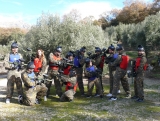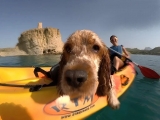Those outside the diving world might think this is madness. They might have a point, but they don't realise that the planning stage is already part of the enjoyment, not to mention crucial for safety.
Before the Dive
The planning phase will likely take most of our time. We invest our hopes in carrying out a specific activity, and it should meet all our expectations. One mistake and this excitement could turn into disappointment.

Read our advice and we'll help you avoid pitfalls.
- Meet with your diving buddies and agree on the type of dive you want to do, always considering the least experienced members of the group.
- Collectively agree on depth/time limits and stick to them.
- Choose a primary dive site and an alternative in case weather conditions prevent diving at the first location.
- Gather information about both sites. Nowadays there are dive maps, nautical charts that will prove useful, graphic information in magazines and, of course, the Internet.
- Check the weather forecast. You can do this through our pages, with meteorological information for your area.
- In peak season, make boat reservations and book your hotel well in advance - don't leave it to chance if you're a large group or you might watch your boat sail away from the dock.
- Check all your equipment at home: your cylinder should be tested, the regulator must work perfectly, the BCD shouldn't inflate by itself or lose air, etc.
- Check the expiry dates of your certifications and insurance.
- Pack a box with tools and spares containing the most essential replacement parts: O-rings, mask and fin straps, a spare mask, etc. A basic first aid kit will help you "repair" yourself or your buddies if needed.

- It's useful to bring a mobile phone with charged batteries and coverage. Make a list of phone numbers for all group members, rescue services, Red Cross, Civil Protection, security forces, hospitals, local hyperbaric chambers, etc. Very important: keep it switched on.
- If diving independently, inform your family or the dive centre about your planned activity and location as precisely as possible. Agree a return time - if you're late, call to notify them, otherwise they may raise the alarm.
- When packing your dive bag, do it in reverse order of use. Wrap delicate equipment in your wetsuit, don't use side pockets for this. This prevents unwanted damage.
- Depending on the number of divers, allow enough time to board the boat without rushing, to enter the water together, etc. Be punctual and insist on punctuality.
- When you reach the chosen site, check the sea conditions and plan your route before entering. Pay attention to currents and tides.

- If you've chosen a boat for diving, it should be comfortable, have enough capacity for your group and meet necessary safety requirements (oxygen equipment and auxiliary vessel). There should always be a crew member aboard who knows how to operate it.
- The group should stay together rather than spread out across the boat.
- Once your BCD and regulator are assembled on the cylinders, lay them on deck; this prevents damage from waves or accidents. Stow equipment properly if travelling long distances.
- For deep dives, insist on a safety cylinder at three metres.
- Assess your physical condition. Don't feel pressured by your group - if you don't feel like diving, don't. Sometimes group pressure begins before entering the water. Be cautious with previous night's parties.
- Remember that fatigue, stress and alcohol are among the risk factors.
- Form groups and buddy pairs according to everyone's affinities. Pairing a photographer with a long-distance swimmer type buddy doesn't work (you'd lose each other in five minutes).
- Groups shouldn't be too large.
- Check that all your buddies know the diving signals.
- In summer, assemble your gear before putting on your wetsuit. This prevents overheating if there are last-minute problems.
During the Dive
This is the most important part, where we've invested our hopes and want everything to go as planned. Although we've been meticulous in our preparation and enjoyed it, one mistake could ruin everything. Let's examine the steps to follow:

- The group leader should know the area well, regardless of their certification level.
- If you get separated underwater, allow one minute for search before surfacing to regroup.
- Plan your route according to the air consumption of the person who uses air fastest. When they reach half their supply, turn back.
- If you've changed any equipment affecting buoyancy, adjust your weights until you achieve slightly negative buoyancy at the surface.
- To be an excellent buddy, help others and accept help - there are no "super" men/women in diving.
- The group leader should enter first and exit last. They'll check the current, secure the anchor at the start and release it before surfacing.
- No one should dive deeper than the group leader.
Everything went perfectly, we achieved our objectives, but let's remember that people generally remember minor mishaps more than wonderful dives. You might think the "after" matters little, but it's crucial for perfecting a great day. Here's how:
- Before boarding, hand heavy equipment to the skipper or buddies. Start with weights; hold them by the belt, not the buckle, to prevent drops. Then pass up the BCD with cylinder, and finally, if using an inflatable, board without removing your mask, using your fins for propulsion. Or use the boat's ladder after handing up all equipment.
- Once aboard, store everything in a mesh bag or with your gear. Take special care to prevent impacts, particularly with your mask.
- Back at port, help others unload the boat. At the dive centre, thoroughly rinse all equipment. Each item usually has its own freshwater tank. Don't rinse your wetsuit in the control equipment tank. Don't leave items scattered - check everything as you pack it away, protecting delicate items. This also deters those rare but troublesome light-fingered "friends".
- Discuss the dive with your buddies. If someone had problems, don't "reproach" them - offer encouragement. Your turn may come.
- Remember to log the dive in your logbook - it may prove very useful for future dives in the area. Note all interesting features you observed.
- A good meal will provide the perfect opportunity to plan your next dive.












